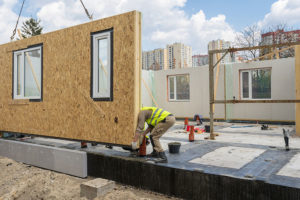Why the Michigan Supreme Court’s Definition of a “Modular Home” Matters in All Real Estate Transactions
 As real estate lawyers, we know that clarity, thoroughness, and precision are indispensable elements of the documentation involved in any transaction. To the extent possible, there should be no grey areas, no ambiguities, and no blind spots. But the English language doesn’t always cooperate, especially when technology or other developments muddy the waters around the meaning of a word or term that has been used for decades, if not centuries. This is the issue the Michigan Supreme Court recently faced when interpreting the meaning of “modular home” in a residential restrictive covenant.
As real estate lawyers, we know that clarity, thoroughness, and precision are indispensable elements of the documentation involved in any transaction. To the extent possible, there should be no grey areas, no ambiguities, and no blind spots. But the English language doesn’t always cooperate, especially when technology or other developments muddy the waters around the meaning of a word or term that has been used for decades, if not centuries. This is the issue the Michigan Supreme Court recently faced when interpreting the meaning of “modular home” in a residential restrictive covenant.
When Contract Language Doesn’t Contemplate New Types of Construction
At issue in Thiel v. Goyings was a restrictive covenant for homeowners in a lakefront subdivision that put the following limitation on their lots:
All residences shall be stick-built on site and no geodesic dome, berm house, pre-fabricated or modular home, mobile home, shack or barn will be erected on any of the Parcels unless provided for herein
The defendants built a custom-designed home on their property using a “systems-built” construction method, a new hybrid approach that integrates modular components into stick-built structures. When completed, approximately 59 percent of the home was stick-built, while 41 percent of the structure was made of modular components.
While the house was under construction, the defendants’ neighbors asserted the house was a “pre-fabricated or modular home” that violated the restrictive covenant and filed suit to have the house demolished.
The trial court dismissed the case because the covenants “did not contemplate a home of the type built by Defendants.” The Michigan Court of Appeals reversed the trial court, holding that the defendants’ home unambiguously fit the commonly understood definition of “modular,” even though the court never actually construed the disputed term “modular home.” It ordered the house torn down.
The Michigan Supreme Court reversed, noting that “we consider challenges to restrictive covenants in a contextualized, case-by-case manner,” and that “any uncertainty or doubt must be resolved in favor of” the property owner subject to the restrictive covenant.
How Modular Is Modular?
The court framed the question at issue as: “how modular does a home need to be to be a modular home?” It concluded that “the most natural reading of the phrase ‘modular home’ is a home that is mostly or generally modular.” The court held that the home was not mostly modular, stating “the Goyingses’ home is not a ‘modular home’ as the restrictive covenants use the term.”
As advancements in technology continue to outpace our language, whether in construction or other fields, documents must use language that relies more on detailed descriptions as to what is allowed, prohibited, or at issue rather than mere adjectives that may be obsolete in a matter of years.
If you have questions regarding restrictive covenants, subdivision or homeowner association rules, or other real estate issues, please contact the Real Estate Practice Group at Kreis Enderle today to discuss your concerns.
